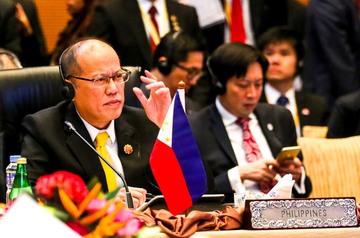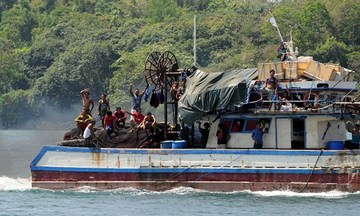On his last ASEAN Summit, Philippine President Benigno Aquino gets tough on China over its reclamation of disputed islands in the South China Sea (West Philippine Sea)

GRIM. President Benigno S. Aquino III focuses on the discussions during the 18th ASEAN – Japan Summit in Malaysia on Sunday, 22 November 2015 at the sidelines of the 27th ASEAN Summit and Related Summits. Photo by Lauro Montellano Jr./ Malacañang Photo Bureau
“It has come to a point wherein we are now no longer allowed to enter areas within our Exclusive Economic Zone.”
Philippine President Benigno Aquino III elevated the South China Sea dispute to the premier East Asia forum tackling geopolitical issues, saying the issue is relevant to all nations seeking to resolve maritime disputes.
(READ: ASEAN Summit opens under shadow of terror)
At the East Asia Summit here on Sunday, November 22, Aquino detailed incidents of Chinese aggression in the disputed sea. He urged Beijing to comply with an impending ruling on the Philippines' historic arbitration case.
“The world is watching and expects no less from a responsible global leader,” Aquino told 17 world leaders including US President Barack Obama and Chinese Premier Li Keqiang.
(WATCH: Aquino blasts China at ASEAN Summit)
It was the 8th time that Aquino mentioned the maritime row in the two days of the ASEAN summit and related meetings. The 27th ASEAN Summit in the Malaysian capital is Aquino's last as his term ends in 2016.
The East Asia Forum gathers the 10 members of the Association of Southeast Asian Nations (ASEAN), Australia, China, India, Japan, New Zealand, Russia, South Korea, and the United States.
Two days before the resumption of hearings at The Hague-based arbitral tribunal where the merits of the case is up for discussion, Aquino cited the previous statement of Chinese President Xi Jinping that Beijing has no plans to “militarize” the dispute.
“As the arbitration process we have entered into continues to its logical conclusion, we are hopeful that China would honor its word and respect the rule of law,” he said.
China has said it will not abide by the tribunal's ruling, which could come out by mid-2016.
Still, Aquino recognized what he called the “growing support” for arbitration from the international community. Obama is among the world leaders who expressed support for arbitration as a peaceful means of dispute settlement.
“It is regrettable that China continues to massively reclaim and build structures in the sea known by many names, in total disregard of international law as well as the Declaration on the Conduct of Parties in the South China Sea,” he said.
On Saturday, the Philippine president said China must take the lead in finalizing negotiations on the Code of Conduct as a more powerful, richer, and older nation.
'Our fishermen are losing livelihood'
Aquino began his discussion on the maritime dispute by enumerating the times China violated the Philippines' rights under the UN Convention on the Law of the Sea (UNCLOS). Under UNCLOS, a country has the exclusive right to exploit resources like fish and oil within a 200 nautical-mile Exclusive Economic Zone (EEZ).
The President explained that Filipino fishermen suffer from Beijing's aggressive acts.
“I have also had to respond to fishermen in my country, complaining about how they can no longer fish in their traditional waters; they ask for explanations why they can no longer take shelter within Scarborough Shoal during times of inclement weather,” he said.
MARINE RESOURCES. Filipino fishermen wave from their fishing boat as they sail off from the port of Masinloc town, Zambales province, north of Manila on May 10, 2012, for a fishing expedition near Scarborough Shoal. File photo by Ted Aljibe/AFP
Aquino was referring to the shoal that was the subject of a standoff between Manila and Beijing in 2012. China's refusal to withdraw from Scarborough Shoal ultimately prompted Aquino to order the filing of the arbitration case.
The Southeast Asian leader said that the first incident of Chinese aggression under his watch was when Chinese vessels forced a survey ship that won a service contract from the Philippines out of the Reed Bank, an area 80 miles from the Philippine island of Palawan.
Aquino reported that another incident was when Chinese fishing boats were caught carrying endangered species just 120 miles from the Philippine province of Zambales.
A recent event was when a Chinese Navy frigate allegedly challenged another survey ship conducting studies on an awarded contract about 40 nautical miles from Palawan.
“We had been asked not to make these incidents public, and we agreed, in an effort to deescalate the situation. However, the incidents did not cease,” Aquino said.
Japan, UN meetings
Aquino again brought up the dispute in the ASEAN summit with Japanese Prime Minister Shinzo Abe. Japan also has a row with China over the Senkaku or Diaoyu islands in the East China Sea.
The Philippine chief executive noted that Japan consistently supported the Declaration on the Conduct of Parties in the South China Sea, and the establishment of the Code of Conduct.
“Japan has taken a strong stand against the use of intimidation, coercion, and force, as well as unilateral actions that seek to change the status quo in the disputed areas,” he said.
Aquino highlighted the arbitration case, this time in the ASEAN summit with UN Secretary-General Ban Ki-Moon.
The President said the Philippines filed the arbitration case because it believes in international rules and norms.
Security officials have said that the dispute is the Philippines' biggest national security issue.
http://www.rappler.com/world/regions/asia-pacific/113694-aquino-china-why-bar-us-waters


No comments:
Post a Comment
Note: Only a member of this blog may post a comment.